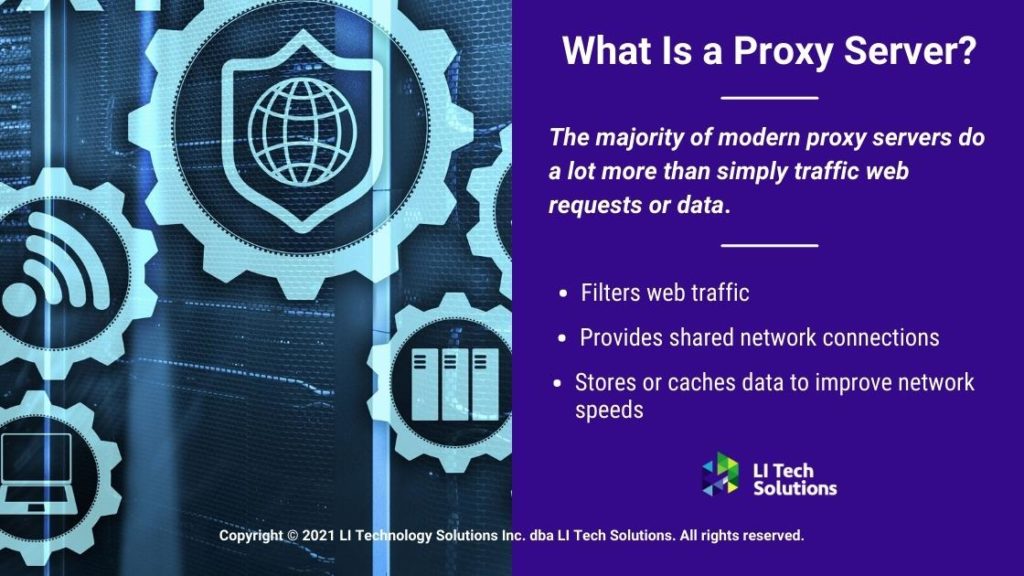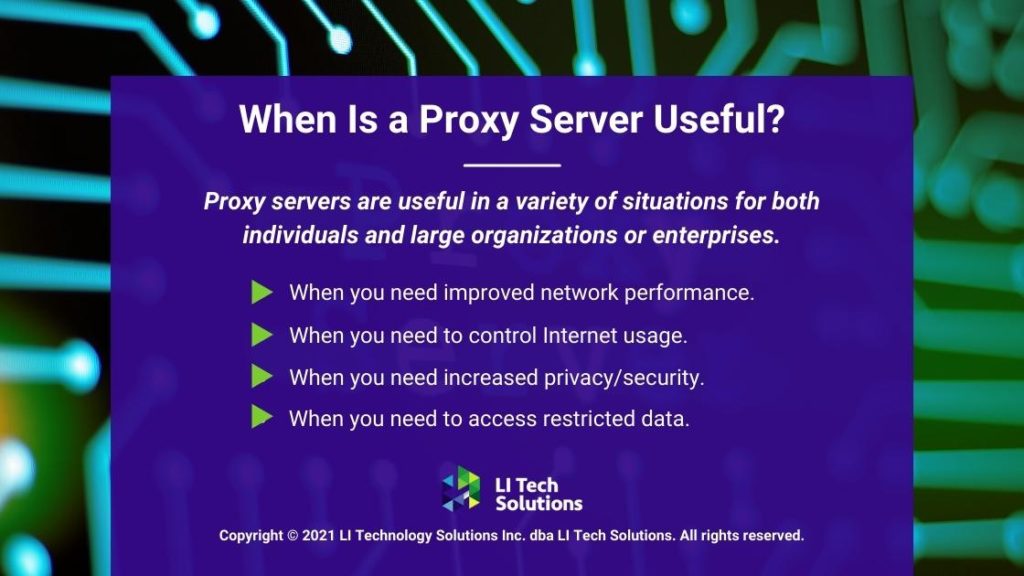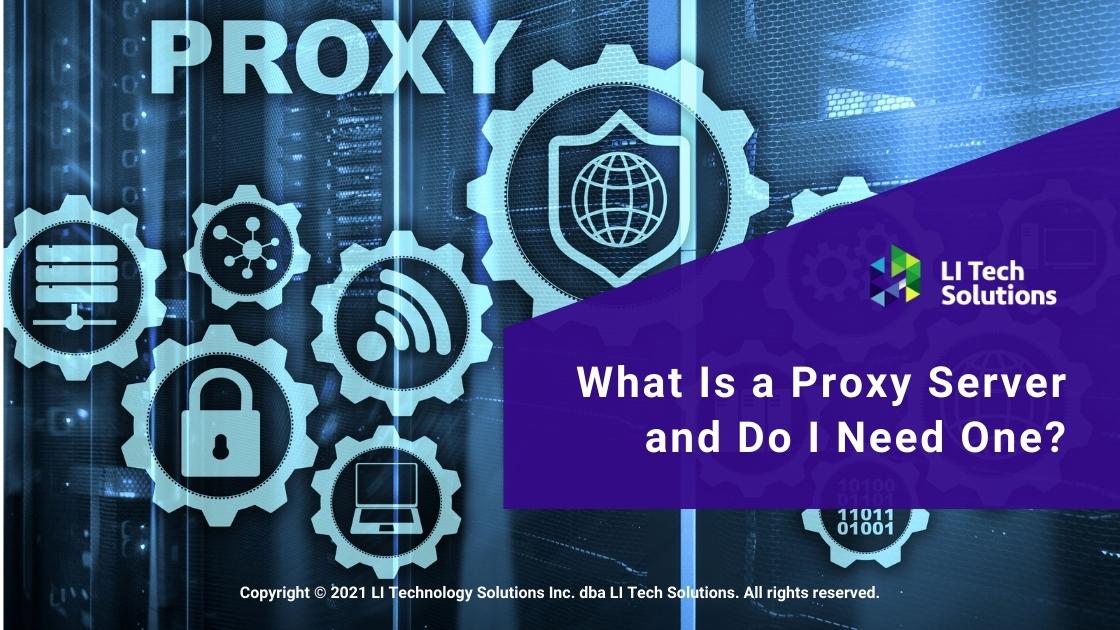What is a Proxy Server?
In a nutshell, a proxy server is an “intermediate” server that stands between an original server and a destination server. When one computer sends information to another, that information may need to pass through a third server – the proxy server. This article covers what a proxy server is, how it works, and benefits it provides.
Most Internet traffic is routed through proxy servers (with very few exceptions). Individuals use their terminals to query other computers for information, and their requests and responses are sent through proxy servers.
But why use proxy servers if they’re just in-between two computers exchanging information? The majority of modern proxy servers do a lot more than simply traffic web requests or data, ranging from filtering web traffic to offering shared network connections to storing or caching data to improve network speeds.
In truth, individuals and organizations alike both benefit from proxy servers and they may occasionally decide to use proxy servers for specific purposes.
How a Proxy Server Works
Each terminal connected to the Internet (including computers or mobile devices) has an IP or Internet protocol address. A given terminal’s IP address is essentially the “street address” of that terminal. The IP address allows other computers to find it and helps proxy servers send traffic to that terminal when needed.
For most Internet traffic flow, a proxy server is another computer connected to the Internet with its own unique IP address.
When a user sends a data request, the request goes to the proxy server. The proxy server then makes the data request on behalf of the original requester. When the responding terminal sends data back, the proxy server collects the data and sends it to the first computer.
Of course, proxy servers can make changes to the data they collect or store because they are in-between the beginning and end computers in data exchange. For example, proxy servers can change the IP addresses of originating terminals, encrypt data, and more.

When is a Proxy Server Useful | Long Island Tech Solutions Goes into Detail
Proxy servers are useful in a variety of situations for both individuals and large organizations or enterprises.
When You Need Improved Network Performance
Proxy servers may first and foremost improve loading speeds and bandwidth savings. By caching data for popular websites, such as Wikipedia or a company’s home site, the load time for those websites goes down.
Proxy servers can essentially save copies of frequently visited websites and only need to update the saved data occasionally. This, in turn, reduces network traffic and may lead to network performance improvements as well.
In some cases, this can save organizations time and money.
When You Need to Control Internet Usage
Proxy servers may also be used to monitor and control Internet usage. As the servers between originating terminals and recipient computers, proxy servers may allow:
- Administrators to observe Internet traffic and see how employees are using the Internet. For example, most companies don’t want employees to be serving social media while on the clock
- Administrators or parents to block certain websites, including websites with inappropriate material for work or a child’s age
- Anyone to monitor and log web requests to check web traffic and gather data
- And more
This aspect of proxy servers is important for businesses, marketing agencies, parents, schools, and other institutions or individuals.
When You Need Increased Privacy/Security
Proxy servers furthermore provide benefits for privacy and security. For example, individuals can use proxy servers to change their IP addresses so that other individuals or organizations can’t tell where their web requests came from. This is a form of identity protection and is a major part of VPN (virtual private network) security.
A VPN can protect identities by:
- Masking IP addresses or countries of origin
- For example, a network user sends a request for information from a recipient terminal. The terminal, while sending the data, also sent a tracking cookie after the information request
- However, the tracking cookie only encounters the proxy server/VPN IP address. It reports this IP address back to its sender
- As a result, the original requester of the data has their identity protected and their IP address remains anonymous
Additionally, companies and individuals alike can configure owned proxy servers to encrypt web requests. This may prevent malware sites from getting access to the proxy server, prevent spying or capturing of user traffic/data, and more.
Companies may also use proxy servers and VPNs for the same privacy benefits as described above. Proxy servers can protect employees from accidentally giving hackers or cyber criminals access to sensitive corporate information or passwords.

When You Need to Access Restricted Data
Lastly, proxy servers may allow users to access restricted or blocked resources. For example, an individual who wants to watch a TV show that is restricted in their country may be able to get around government firewalls by logging into a proxy server from another location.
When they query a recipient website for the TV show’s stream, they receive the data since it flows through the proxy server and never encounters the national firewall.
Thus, proxy servers are an important part of information freedom and allow citizens in restrictive countries access to more information or media than they would have otherwise.
Set up Your Proxy Server with The Best MSP in New York: LI Tech Solutions
In the end, proxy servers are an important part of the Internet overall and play a major role in all the web traffic that flows throughout the World Wide Web each day. In most cases, you never choose to use a proxy server intentionally.
But your organization may intentionally decide to leverage proxy servers for several of the advantages above, including increased security and better monitoring of your employees’ workplace habits.
Proxy servers can help you save money and make better use of company time by giving you more direct control over the traffic that flows to and from your company’s computers.
Fortunately, LI Tech Solutions can help you both set up and maintain proxy servers for the health of your organization and any other data or traffic-related goals you may have. As experts in data protection, server management, and more, we are well-equipped to help you benefit from proxy servers linked to your organization.
Contact us today for more information.

